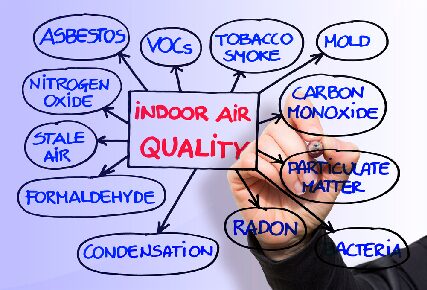Transform Your Basement: Expert Advice for Cleaner, Healthier Air
Sep 09, 2024

Is your basement dark, smelly, and kind of dirty? If so, you probably don’t love your basement very much. As a homeowner, it’s important to understand what causes poor basement air quality and how you can improve it.
Poor basement air quality can lead to various health issues and discomfort for you and your family. To have a happy and healthy home, it’s important to first understand the causes of poor air quality and how you can easily identify and prevent them.
Breathing in contaminated air regularly may exacerbate existing health conditions or cause new ones to develop. It’s essential to be aware of how basement air quality can affect your well-being and take proactive steps to improve it for a healthier home environment.
Common Causes of Poor Basement Air Quality
Basements are prone to poor air quality due to various factors.
Inadequate Ventilation: Poor airflow can lead to a buildup of pollutants like radon gas and mold spores. Moisture issues, such as water leaks or high humidity levels, can promote the growth of mold and mildew, further compromising air quality.
VOCs: Some household products, like cleaning agents or paints, emit volatile organic compounds (VOCs). Additionally, dust mites thriving in dusty environments can trigger respiratory issues.
These contaminants can aggravate allergies, respiratory problems, and even more serious conditions over time if left unchecked. Identifying these common causes is crucial in improving basement air quality and ensuring a healthy living environment for you and your family.
Signs of Poor Basement Air Quality
When it comes to the air quality in your basement, there are several signs that may indicate a problem.
Musty or Damp Odors: These unpleasant (and dangerous) scents often suggest mold growth. If you notice an increase in allergy symptoms or respiratory issues when spending time in the basement, it could be caused by mold sprouting from dark, moist areas of your basement.
Visible Mold Growth: This is a much clearer indication that something is wrong. If you see green or black spots forming on walls, ceilings, or belongings stored in the area, you likely have a mold infestation. Mold thrives in damp and dark environments like basements and can have serious health implications if left unchecked.
Condensation: Whether it’s on windows, walls, or the ceiling, condensation can also signal poor ventilation and circulation of air in your basement. If left untouched, condensation mixed with poor ventilation can lead to mold and other issues down the road. If you see it in your basement, it’s time to take action!
Improving Basement Air Quality
If you’ve discovered issues with the air quality in your basement, there are steps you can take to improve it.
Increase Ventilation: Reduce stagnant air by opening windows or using fans, you can circulate fresh air into the space. Our recommendation is to install an egress window – these can significantly improve ventilation, add natural light, and provide an escape route in case of an emergency.
Address Moisture Sources: Fixing leaks, insulating pipes, and using a dehumidifier can help control humidity levels to prevent mold from forming. We offer a range of basement waterproofing services. Contact us to determine which service is right for your home!
Regular Cleaning and Maintenance: Prevent problems by addressing them before they’re a problem. Regularly dusting, vacuuming, and removing clutter can help reduce allergens and pollutants present in the space, creating a healthier environment for you and your family.
